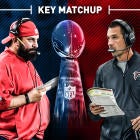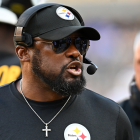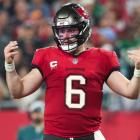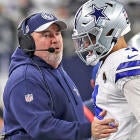Note: This is the first of two Key Matchup posts we'll be running for Super Bowl LI. The second post, which will run on Friday, will focus on the Patriots offense vs. the Falcons defense.
According to almost any metric you can find, the 2016 Atlanta Falcons offense was not just the best in the league this season, but one of the best in recent memory.
The Falcons finished the season first in scoring, totaling 71 points more than the next-closest team. The gap separating them and the Saints was the fifth-largest differential between first and second since the league expanded to 32 teams in 2002.
The Falcons were not just explosive; they were also efficient. They scored a touchdown or field goal on 54.1 percent of their drives, the highest rate of any team since 2002. Only 5.7 percent of their drives ended in turnovers, fourth-lowest since 2002. They averaged 3.03 points per drive, making them one of only two teams (along with the 2007 Patriots) in the same time frame to average in excess of three points per drive.
They finished second in total yards this season, but their 6.7 yards per play is tied with the 2004 Colts and 2011 Saints as the highest since that 2002 expansion. In that same time frame, their 39 yards per drive was the third-best figure.
The Falcons also led the NFL in Offensive DVOA (Defense-adjusted Value Over Average, which adjusts performance for down, distance and opponent), per Football Outsiders. Their traditional stats are all the more impressive because they did it against the second-toughest schedule of defenses in the league.
Atlanta had a strong rushing offense (fifth in yards per game and per carry, seventh in DVOA), but was led largely by the dominant performance of Matt Ryan and the passing game. Ryan led all quarterbacks in almost every statistical category, and so did the Falcons' passing offense as a whole. Ryan spread the ball all over this season, completing passes to 15 different receivers, with 13 grabbing touchdowns.
It's a cliché to say that a quarterback makes the defense cover every blade of grass, but that's exactly what Ryan did this season.
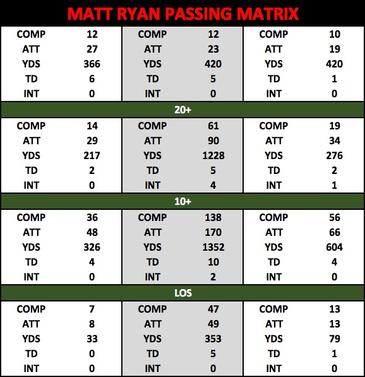
Ryan operated with six main targets: Julio Jones, Mohamed Sanu, Taylor Gabriel, Devonta Freeman, Tevin Coleman and his tight end (first Jacob Tamme, then Austin Hooper). To suss out the chances the Patriots have of slowing the Atlanta offense this season, it's a good idea to take a look at how they might match up with each of those targets. To do so, we'll split them into two groups: the receivers in one, the backs and tight end in the other.
Jones, Sanu and Gabriel
How Bill Belichick and Matt Patricia decide to match up with Jones will dictate everything else about their pass defense strategy.
The Patriots typically employ one of two strategies against No. 1 receivers of Jones' stature: They either shadow with Malcolm Butler, or they bracket with a combination of Logan Ryan (or more recently, Eric Rowe) and a safety while siccing Butler on the No. 2 wideout. For example, Butler shadowed Antonio Brown on 36 of 40 routes in Week 7, per Pro Football Focus tracking, but Butler covered Will Fuller while the Patriots bracketed DeAndre Hopkins with Ryan and a safety over the top in Week 3.
However, the Pats will also sometimes flip back and forth between these two strategies throughout a game. For example, Butler covered Jarvis Landry on 15 routes and DeVante Parker on 26 routes in Week 2, while Ryan was on Landry for 18 routes and Parker for 21.
It's worth examining both scenarios.
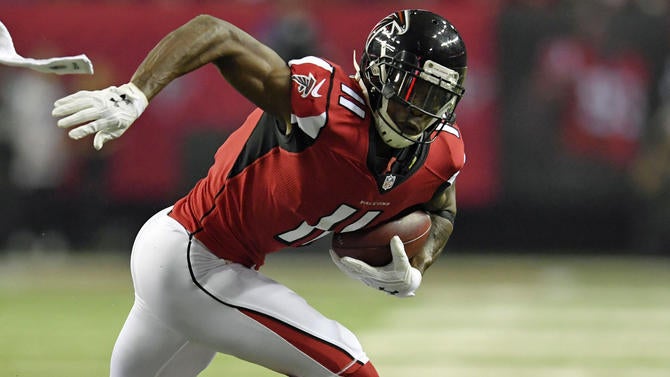
If the Pats use Butler to shadow Jones, that likely leads to a matchup of Ryan and Sanu in the slot, with Rowe on Gabriel on the opposite side. Sanu operated out of the slot on 59.8 percent of his snaps this season, per Pro Football Focus, and Ryan has become the Pats' top option in the slot down the stretch. (A stretch where he has played some incredible football, by the way: he has allowed a 66.7 passer rating on throws in his direction since the Pats returned from their bye.)
Gabriel is mostly a speed guy the Falcons use to stretch the field vertically, but he also gets used on end-arounds and jet sweeps. Rowe has experience as a safety and only missed two tackles all season, making him a logical option on that type of player.
The more interesting scenario involves a bracket on Jones rather than a shadow, because it opens up two different questions: A) Which corner is involved in the bracket?; and B) Which receiver does Butler cover instead of Jones? New England can use Ryan in the bracket and have a cover corner nearly as good as Butler, plus a safety on the No. 1 option. That would likely lead to Butler sticking in the slot on Sanu and Rowe staying with Gabriel. They Pats can also use Rowe and a safety over the top on Julio, with Ryan occupying his usual space in the slot and Butler taking away Matt Ryan's best deep threat.
The best bet involves Belichick and Patricia presenting Matt Ryan with multiple looks throughout the game, especially if whatever strategy they begin the game with doesn't appear to be working.
Freeman, Coleman and Hooper
How the Pats match up with the backs and Hooper will depend on whether they show more Cover-2 looks or single-high safety looks. New England is a game-plan team on both offense and defense, so which look we'll see more of is an open question.
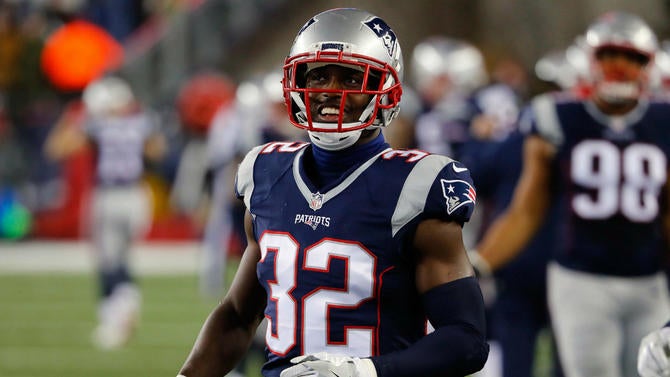
In Cover-2, Devin McCourty will take the deep half of one side of the the field and Duron Harmon or Patrick Chung will man the other. When they go single-high, McCourty will man the back end by himself, covering as much ground as possible while Harmon or Chung rolls down into the box and either matches up with Hooper or one of the backs, or plays a hook-to-curl zone in the middle of the field.
Hooper is not as threatening a receiver as some other tight ends the Patriots have faced this season, so it would not be a surprise if he saw a linebacker in coverage all game long. The bigger receiving threats among this group are the running backs, which is not great for New England -- the Pats ranked 20th in DVOA on throws to running backs this season, per Football Outsiders.
Freeman and Coleman were among the best pass-catching backs in the league. They combined for 85 receptions, 883 yards and five touchdowns on 105 targets.
Freeman is the more traditional receiving back, mostly coming out of the backfield for swing passes, screens and option routes. Coleman is a bit more versatile; he does all those things and more. He tore up the Broncos earlier this season while lining up on the outside and in the slot, like a wide receiver.
The Patriots have a couple players with experience at both safety and corner (McCourty, Rowe), and it makes sense to use one of them on Coleman, rather than a linebacker, if he splits out of the backfield. It takes away either the best man over the top or a corner that might be better suited to guarding a receiver, but it's better than letting Ryan fire quick-hitters to a player who has easily defeated the linebacker in front of him. Dont'a Hightower might be able to handle the assignment, but he's extremely important to the middle of the defense in zone coverages and on blitzes through the A-gap.
With Freeman, it'll be important to tackle quickly and effectively, to not overrun him on screens, to force him back to the middle on swings to the outside, and to stay as attached as possible on option routes.









